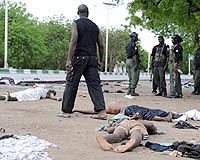 |
New York (AFP) Dec 30, 2009 The failed attempt to blow up an Amsterdam-Detroit flight last week could prove a bonanza for airport security firms, especially the makers of full-body scanners. "It might put some pressure to buy more full-body scanners... The US Congress will probably do something to increase the funding," Michael Boyd, an aviation consultant, told AFP. The high-tech body scanners can detect hidden objects, such as explosives, even when they are concealed by clothing, unlike the metal detectors passengers walk through in airports worldwide to access flight gates. The Netherlands, Britain and Nigeria have announced plans to rapidly deploy the use of full-body scanners at their airports. In the United States, the scanners are already in use at 19 airports, a practice that could become widespread. "The US alone has 450 airports with about 2,000 security lanes, which gives an idea of the potential" of the market, said Joe Reiss, a spokesman with American Science and Engineering (ASEI), one of the world's four leading makers of full-body scanners, in an interview with AFP. The other manufacturers are two US companies, L-3 Communications and Rapiscan Systems, a unit of OSI Systems, and British rival Smiths Detection. Shares in L-3 gained 3.0 percent between last Thursday and the market close Wednesday in New York, and reached a 14-month high on Tuesday. Shares in ASEI and OSI leapt 10.5 percent and 26 percent, respectively, over the same period. According to Reiss, a body scanner costs about 100,000 dollars, a hefty expense compared with the 10,000-dollar price tag of a metal detector portal. The latest generation of X-ray baggage scanners cost some 150,000 dollars, while those used to screen checked baggage, a larger volume, cost one million dollars. Steve Lott, spokesman for the International Air Transport Association (IATA), said the body scanners cost about a half million dollars. Lott said the body scanners have two drawbacks: "cost and speed." Security services for airports and airlines are also expected to attract demand, and benefit smaller companies like Firstline, a security personnel specialist, and Covenant, which provides airport screening and security in airport zones. ICX Technologies, whose share price has also soared since Monday, makes detectors for chemical, biological and nuclear substances, used notably to screen liquids at airports. Among the other techniques being looked at, according to the US Transportation Security, are electronic boarding tickets, scanners for prosthetics and bandages, and small, easily manipulated explosives detectors. IATA, however, warned in a statement Wednesday that "adding new hardware to an old system will not deliver the results we need." The group called on governments to rethink their security model. "It is time for governments to invest in a process built around a checkpoint of the future that combines the best of screening technology with the best of intelligence gathering."
Share This Article With Planet Earth
Related Links The Long War - Doctrine and Application
 Obama vows to hunt extremists, Al-Qaeda claims jet attack
Obama vows to hunt extremists, Al-Qaeda claims jet attackKaneohe, Hawaii (AFP) Dec 29, 2009 President Barack Obama has vowed to hunt down extremists wherever they plot attacks against the United States, as Al-Qaeda said it hatched the Christmas Day attempt to blow up a US-bound airliner. Obama pledged Monday to "disrupt, to dismantle and defeat the violent extremists who threaten us -- whether they are from Afghanistan or Pakistan, Yemen or Somalia or anywhere where they are plotti ... read more |
|
| The content herein, unless otherwise known to be public domain, are Copyright 1995-2009 - SpaceDaily. AFP and UPI Wire Stories are copyright Agence France-Presse and United Press International. ESA Portal Reports are copyright European Space Agency. All NASA sourced material is public domain. Additional copyrights may apply in whole or part to other bona fide parties. Advertising does not imply endorsement,agreement or approval of any opinions, statements or information provided by SpaceDaily on any Web page published or hosted by SpaceDaily. Privacy Statement |